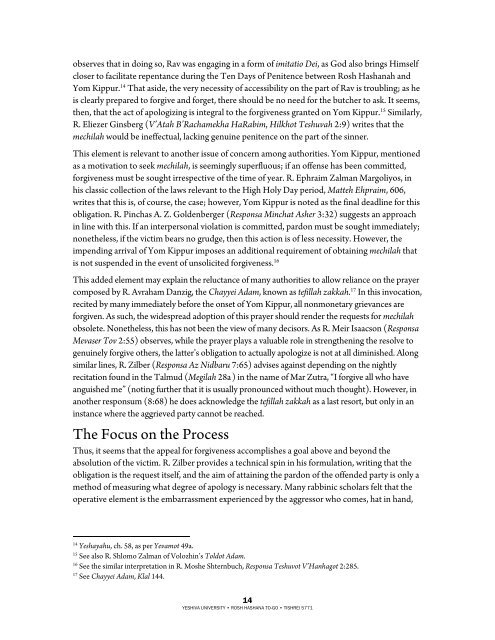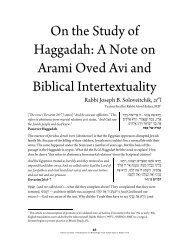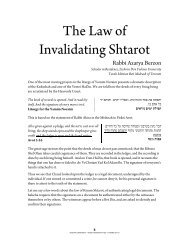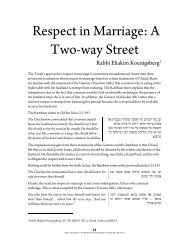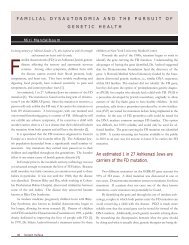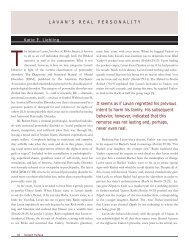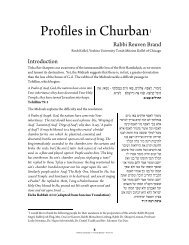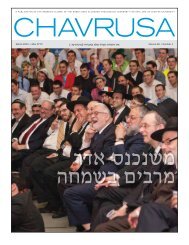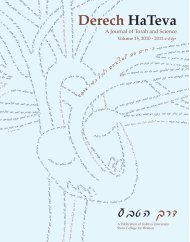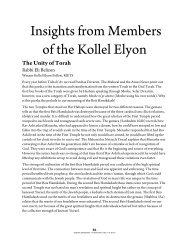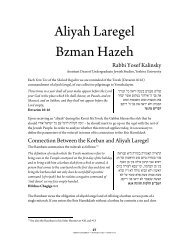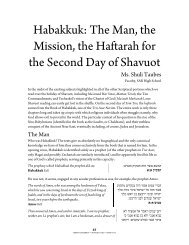YESHIVA UNIVERSITY • ROSH HASHANA TO-GO ... - YUTorah.org
YESHIVA UNIVERSITY • ROSH HASHANA TO-GO ... - YUTorah.org
YESHIVA UNIVERSITY • ROSH HASHANA TO-GO ... - YUTorah.org
Create successful ePaper yourself
Turn your PDF publications into a flip-book with our unique Google optimized e-Paper software.
observes that in doing so, Rav was engaging in a form of imitatio Dei, as God also brings Himself<br />
closer to facilitate repentance during the Ten Days of Penitence between Rosh Hashanah and<br />
Yom Kippur. 14 That aside, the very necessity of accessibility on the part of Rav is troubling; as he<br />
is clearly prepared to f<strong>org</strong>ive and f<strong>org</strong>et, there should be no need for the butcher to ask. It seems,<br />
then, that the act of apologizing is integral to the f<strong>org</strong>iveness granted on Yom Kippur. 15 Similarly,<br />
R. Eliezer Ginsberg (V’Atah B’Rachamekha HaRabim, Hilkhot Teshuvah 2:9) writes that the<br />
mechilah would be ineffectual, lacking genuine penitence on the part of the sinner.<br />
This element is relevant to another issue of concern among authorities. Yom Kippur, mentioned<br />
as a motivation to seek mechilah, is seemingly superfluous; if an offense has been committed,<br />
f<strong>org</strong>iveness must be sought irrespective of the time of year. R. Ephraim Zalman Margoliyos, in<br />
his classic collection of the laws relevant to the High Holy Day period, Matteh Ehpraim, 606,<br />
writes that this is, of course, the case; however, Yom Kippur is noted as the final deadline for this<br />
obligation. R. Pinchas A. Z. Goldenberger (Responsa Minchat Asher 3:32) suggests an approach<br />
in line with this. If an interpersonal violation is committed, pardon must be sought immediately;<br />
nonetheless, if the victim bears no grudge, then this action is of less necessity. However, the<br />
impending arrival of Yom Kippur imposes an additional requirement of obtaining mechilah that<br />
is not suspended in the event of unsolicited f<strong>org</strong>iveness. 16<br />
This added element may explain the reluctance of many authorities to allow reliance on the prayer<br />
composed by R. Avraham Danzig, the Chayyei Adam, known as tefillah zakkah. 17 In this invocation,<br />
recited by many immediately before the onset of Yom Kippur, all nonmonetary grievances are<br />
f<strong>org</strong>iven. As such, the widespread adoption of this prayer should render the requests for mechilah<br />
obsolete. Nonetheless, this has not been the view of many decisors. As R. Meir Isaacson (Responsa<br />
Mevaser Tov 2:55) observes, while the prayer plays a valuable role in strengthening the resolve to<br />
genuinely f<strong>org</strong>ive others, the latter’s obligation to actually apologize is not at all diminished. Along<br />
similar lines, R. Zilber (Responsa Az Nidbaru 7:65) advises against depending on the nightly<br />
recitation found in the Talmud (Megilah 28a ) in the name of Mar Zutra, “I f<strong>org</strong>ive all who have<br />
anguished me” (noting further that it is usually pronounced without much thought). However, in<br />
another responsum (8:68) he does acknowledge the tefillah zakkah as a last resort, but only in an<br />
instance where the aggrieved party cannot be reached.<br />
The Focus on the Process<br />
Thus, it seems that the appeal for f<strong>org</strong>iveness accomplishes a goal above and beyond the<br />
absolution of the victim. R. Zilber provides a technical spin in his formulation, writing that the<br />
obligation is the request itself, and the aim of attaining the pardon of the offended party is only a<br />
method of measuring what degree of apology is necessary. Many rabbinic scholars felt that the<br />
operative element is the embarrassment experienced by the aggressor who comes, hat in hand,<br />
14 Yeshayahu, ch. 58, as per Yevamot 49a.<br />
15 See also R. Shlomo Zalman of Volozhin’s Toldot Adam.<br />
16 See the similar interpretation in R. Moshe Shternbuch, Responsa Teshuvot V’Hanhagot 2:285.<br />
17 See Chayyei Adam, Klal 144.<br />
14<br />
<strong>YESHIVA</strong> <strong>UNIVERSITY</strong> <strong>•</strong> <strong>ROSH</strong> <strong>HASHANA</strong> <strong>TO</strong>-<strong>GO</strong> <strong>•</strong> TISHREI 5771


